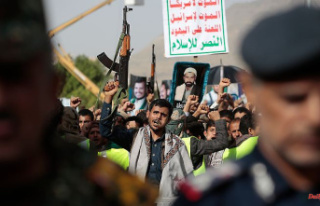Putschists only overthrew the government in Burkina Faso in January. A few months later, there is another coup in the West African country. While the head of the previous junta is fleeing abroad, the new ruler announces that he wants to "revive" the fight against the jihadists.
The head of the military junta, Paul-Henri Sandaogo Damiba, who was deposed after the coup in West African Burkina Faso, has fled to neighboring Togo, according to diplomatic circles. Previously, "Damiba himself offered his resignation in order to avoid confrontations with serious consequences," explained the country's leading religious and community representatives. The new self-proclaimed ruler, Ibrahim Traoré, announced that he had received the backing of army chiefs to "reinvigorate" the fight against the jihadists.
In a statement, the Economic Community of West African States (ECOWAS) welcomed the fact that the various actors in the Burkinabe drama had accepted "a peaceful settlement of their differences". An Ecowas delegation will travel to Ouagadougou on Monday, the statement said.
Tensions and protests against French institutions erupted in Burkina Faso after a group of military officials led by Traoré announced on Friday evening that Damiba - who himself came to power in a coup in January - would be deposed. The putschists accused Damiba of planning "a counteroffensive" from a French military base. Rumors circulated online that France was protecting Damiba. Several dozen supporters of the new junta chief threw stones at the French embassy in the capital Ouagadougou on Sunday and set fire to barriers in front of the building. Also on Saturday there was a fire in front of the embassy and an attack on the Institut français in Ouagadougou.
Despite the demonstrations directed against him, the fallen man initially stated that he did not want to withdraw. The rebels cited "the continuous deterioration in the security situation" in the country as a reason for the coup. When he came to power, Damiba promised to make security a priority in a country that had been shaken by jihadist attacks for years. However, his government was unable to calm the situation in the country.












